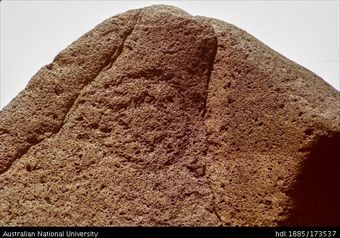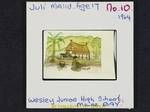Nidok Ceremony , Junior Painim Wok, Balaguan Dances, Vunalaka
- Description:
- Video Casette#1: Nidok ceremony, Video Clip recording by PGS, Dances at Balaguan (Oscar Tovue, Vunalaka) The "nidok" ceremony is performed publicly for the initiation for the men of the clan where the initiated are the next generation of clan members who will then perform these activities to honour the current crop of initiated men. This ensures the survival of the clan’s legacy, including land ownership and cultural identity. The recording of the ceremony involved "tubuan" dancers and feasting with food kept in woven coconeut leaves baskets for distribution to clan members of the "nidok", clan members and general people supporting the ceremony by attendance and acknowledgement of their participation. The video clip filming was by Pacific Gold Studios Greg Seeto on Junior Painim Wok band for their album production with a village setting and lifestyle for the composed songs. The "balaguan" ceremony is a means to draw together people in Tolai communities to assert and honour the cultural, social structure and identity of the clan or "vunatarai" organising the event. It is about feasting and various traditional dance performers. There are various types of song and dance based on life experiences, events, the environment, birds and animals, and human interactions. Traditional Tolai songs and dances may be performed by both males and females together while others are restricted to one gender. Traditional instrument used for beats, rhythm for the song and dance are kundu (hollow wooden drum with lizard skin), pakupak (slit bamboo) and tidir (bamboo or wooden sticks). The garamut (wooden slit drum) beaten by cane sticks and wooden stick depending on type or dance are mainly for tubuan or more special ceremonies. Generally, the typical male, female or combined traditional Tolai song and dance types of performances are; 1. Mix (Male and female): Libung, Bilolo 2. Female: Wutung, Parpari, Patete 3. Male: Perapere, Kulau, Pinpidik, Tabaran, Tubuan (Steven Gagau, October 2019). Language as given: . You can access this item at the PARADISEC website. You will need to sign up or sign in first.
- Format:
- MovingImage
- Collections:
- PARADISEC Catalog
- Contributors:
- Michael Webb
- Content partner:
- PARADISEC
- Availability:
- Not specified
-
Copyright status: All rights reservedFind out more about what you are able to do with this itemThis item is all rights reserved, with means you'll have to get permission from PARADISEC before using it. For more information, please see our use and reuse page.More informationPARADISEC has this to say about the rights status of this item:
Open (subject to agreeing to PDSC access conditions)
What can I do with this item?Non-infringing useNZ copyright law does not prevent every use of a copyright work, and this item may be hosted by an international institute or organisation. You should consider what you can and cannot do with a copyright work.No sharingYou may not copy and/or share this item with others without further permission. This includes posting it on your blog, using it in a presentation, or any other public use.No modifyingYou are not allowed to adapt or remix this item into any other works.No commercial useYou may not use this item commercially.
Related items
Welcome and warm Pasifik greetings
The information on this site has been gathered from our content partners.
The names, terms, and labels that we present on the site may contain images or voices of deceased persons and may also reflect the bias, norms, and perspective of the period of time in which they were created. We accept that these may not be appropriate today.
If you have any concerns or questions about an item, please contact us.

